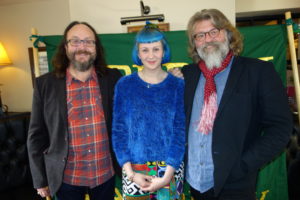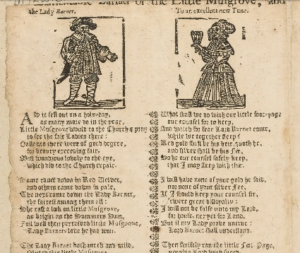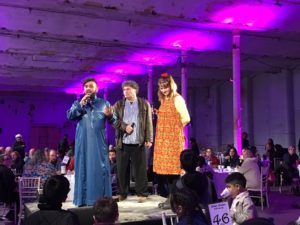How refreshing to see and hear Jennifer Read’s presentation which included songs and dialect poetry. Her enthusiasm for this subject is helping to keep alive our oral Lancashire traditions. Jennifer is a Broadsheet Balladress, broadsheet as in the very large sheets of paper A3 size,two sheets on which songs were written. Essentially they were Victorian work songs about life in the mills and on the canals, omitting railways as they are ‘too high tech’ for Jennifer……

Jennifer Reid with the Hairy Bikers on the Pubs that Built Britain tour at the
Originally Broad sheet ballads were sung in the Civil War about division and strife if you were on the wrong side and known as a ‘rebellious’ household your goods could be sold. By the 19th century they had moved on to more personal emotional matters, love, deception and the struggles of the country bumpkins after being robbed in the industrial areas they had moved to.

A lamentable balld of the little Musgrove and the lady Barnet. Part of an ancient Broadside before 1675. Courtesy of: F. Coles, T. Vere, and J. Wright. Public Domain
“In seventeenth century England, broadside ballads were everywhere. Walk into an alehouse and you would see sheets pasted to the walls—the woodcuts of lords and ladies, shepherds, milkmaids, murderers, lovers, and even murderous lovers vying for your attention. Walk the streets of London and you would see the sheets held up by ballad mongers, with heavily inked black-letter type, waiting to be bought. But you would not just see broadside ballads on walls or in hands, you would also hear them. They were sung in groups in the alehouse, sung individually by a ballad monger, sung at work by apprentice and master, sung in the fields by milkmaids and farmers. Printed with the names of familiar tunes to which they could be sung, broadside ballads were more than art, more than text, and more than song. They were, in a sense, promiscuous—available to all and used in all kinds of ways. Thus broadside ballads really were everywhere. ” (Eric Nebeker (2007) The Heyday of the Broadside Ballad). Essentially they were written for the working classes.
The richness of our Lancashire cultural heritage is evident in the songs of the time. One writer Edwin ‘Woff ‘or Waugh…. wrote of the Weaver of Wellbrook. Songs also epitomised the struggles during the Cotton Famine. Whilst researching in the archives Jennifer came across the work of Paul Graney amongst his occupations and pastimes were historian, climber, collector, pipe fitter, pace egger and much more. At the tender age of twelve he spent half his time in school and half at work. Like many people in the ‘Depression’ he experienced joblessness and went ‘..on the Tramp’ looking for work. Tramps would pass each other walking there and back through the Lancashire cotton towns. People who couldn’t afford a bed in a doss house would pay tuppence to hang over a rope to go to sleep, in Glasgow though it was ‘A penny lean’.

Jennifer Reid at with H and Jules at Northlight Mill, Brierfield at the Shapes of Water Sounds of Hope event.
It is through the work of Paul Graney that many of the songs and narratives survive today. Jennifer found a book in the Manchester Archives that was bookmarked by him. There are about 1,800 of his recordings (we listened to a couple) and apparently the trust and friendship of the times shines through. Paul’s work had an impact on the Folk Revival in the 60′, people like the Fryman’s and Mike Harding who many will be familiar with today.
Jennifer is striving to get a Dialect Poetry workshop going in North East Lancashire, highly likely to be meeting at Booth’s Barrowford it is for anyone with an interest in Lancashire dialect and indeed what happens will be directed by the desires of the group. Jennifer is also planning visits to Manchester Central Library and other archives. So come along and support this enthusiastic young person in keeping our oral traditions alive and start some of your own!
Did you know?
Long Song Seller’s held long rolls of paper with songs printed on and cut them off to sell them, sometimes this resulted in Del boy style antics?
A Pace Egger is someone who takes place in a Mumming Play at Easter time?